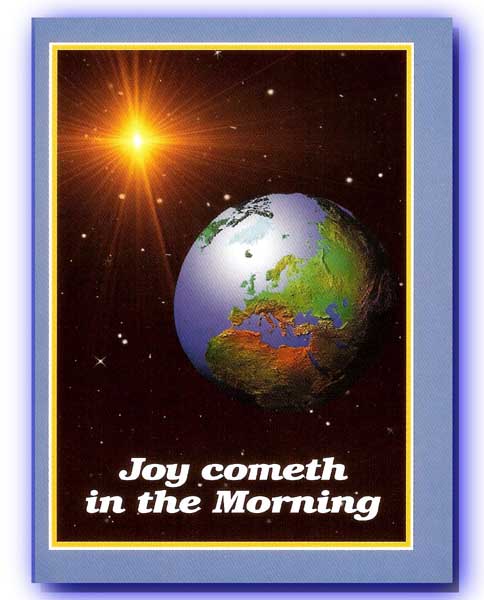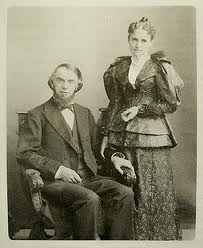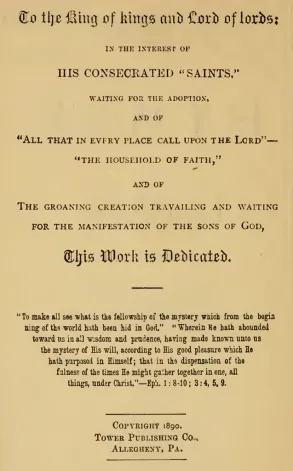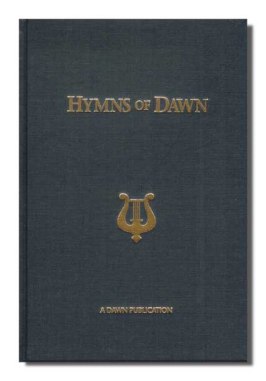Hope’s Consummation — Hymns of Dawn No. 25
“(1) Come, let us shout joyfully to Jehovah! Let us shout in triumph to our Rock of salvation. (2) Let us come into his presence with thanksgiving; Let us sing and shout in triumph to him” (Psalm 95:1,2).
“My mouth shall praise Thee with joyful lips” (Psalm 63:5).
“Until the day break, and the shadows flee away, I will get me to the mountain of myrrh, and to the hill of frankincense” (Song of Solomon 4:6).
Note: “ ‘Myrrh’ is bitter experience and the wisdom gained through such experience. ‘Frankincense’ represents praise and thanksgiving. Hymns of praise often include the Christian’s gratitude for deliverance from suffering that is beyond human endurance. Such help usually evokes praise and thanksgiving. Of course pleasant experiences also bring forth praise, but the type of praise that arises from suffering is on a higher level than praise from pleasure. Verse 6 alludes to praise that arises from suffering.
‘Until … the shadows flee away.’ The shadows of the nighttime experience of the Church will ‘flee away’ when the Church is complete. These are the shadows of the gospel night, the Passover night. Why is myrrh a ‘mountain’ and frankincense a ‘hill’? Two different Hebrew words are used. Our praise can never reach the mark of perfection. What Jesus offered at Calvary far transcends anything we can offer” (Br. F. Shallieu, Notes on the Song of Solomon, pages 37-38).
Here is a recording of Hymn No. 25 from the “Hymns of Dawn” to aid God’s people in singing and making melody in their hearts unto God.
Lyrics
1.
Bride of the Lamb, awake! awake!
Why weep for sorrow now?
The hope of glory, Christ, is thine;
A child of glory, thou.
2.
Thy spirit through the lonely night,
From earthly joy apart,
Hath sighed for one that’s far away,
The Bridegroom of thy heart.
3.
But see, the night is waning fast,
The breaking morn is here;
And Jesus comes, with voice of love,
Thy drooping heart to cheer.
4.
He comes, for O! his yearning heart
No more can bear delay,
To scenes of full unmingled joy
To call his bride away.
5.
This earth, the scene of all his woe,
A homeless wild to thee,
Full soon upon his heav’nly throne
Its rightful King shall see.
6.
His own kind hand shall wipe the tears
From ev’ry weeping eye,
And pains, and groans, and griefs, and fears,
And death itself, shall die.
*******
Bible Scriptures Associated With This Hymn
Psalm 30:4, 5 (ESV) — “(4) Sing praises to the Lord, O you his saints, and give thanks to his holy name. (5) For his anger is but for a moment, and his favor is for a lifetime. Weeping may tarry for the night, but joy comes with the morning.”
Song of Solomon 6:3 (KJV) — “I am my beloved’s, and my beloved is mine: he feedeth among the lilies.”
Matthew 25:6 (KJV) — “(6) And at midnight there was a cry made, Behold, the bridegroom cometh; go ye out to meet him. (7) Then all those virgins arose, and trimmed their lamps.”
John 17:10 (KJV) — “And all mine are thine, and thine are mine; and I am glorified in them.”
2 Corinthians 4:17 (KJV) — “For our light affliction, which is but for a moment, worketh for us a far more exceeding [and] eternal weight of glory;”
Colossians 1:27 (ESV) — “To them God chose to make known how great among the Gentiles are the riches of the glory of this mystery, which is Christ in you, the hope of glory.”
1 John 3:2 (KJV) — “Beloved, now are we the sons of God, and it doth not yet appear what we shall be: but we know that, when he shall appear, we shall be like him; for we shall see him as he is.”
Revelation 21:4 (KJV) — “And God shall wipe away all tears from their eyes; and there shall be no more death, neither sorrow, nor crying, neither shall there be any more pain: for the former things are passed away.”
The History Of This Hymn
Author — Verses 1 to 5 of the 6 verses of this hymn in the Hymns of Dawn (No. 25) were originally written by Sir Edward Denny (1796-1889) who was an Anglo-Irish baronet and composer.
Composer — No information.
*******
JOY COMETH IN THE MORNING
====================

God has promised to bring us joy after the dark night of sin and suffering that we have endured. The above booklet reveals how the plan of God will bring peace and everlasting joy to all creation in His coming Kingdom. Here is the booklet’s content: https://chicagobible.org/images/stories/pdf/JOY%20COMETH%20IN%20THE%20MORNING.PDF
*******
Below we share an excerpt (pages 82 to 88) from STUDY V of Volume 1 of Studies in the Scriptures by Pastor Charles Taze Russell.
“Christ in You, the Hope of Glory.”
This is the great mystery of God which has been hidden from all previous ages, and is still hidden from all except a special class—the saints, or consecrated believers. But what is meant by “Christ in you?” We have learned that Jesus was anointed with the holy Spirit (Acts 10:38), and thus we recognize him to be the Christ—the anointed—for the word Christ signifies anointed. And the Apostle John says that the anointing which we (consecrated believers) have received abideth in us. (1 John 2:27) Thus the saints of this Gospel age are an anointed company—anointed to be kings and priests unto God (2 Cor. 1:21; 1 Peter 2:9); and together with [A82] Jesus, their chief and Lord, they constitute Jehovah’s Anointed—the Christ.
In harmony with this teaching of John, that we also are anointed, Paul assures us that this mystery which has been kept secret in ages past, but which is now made known to the saints, is that the Christ (the Anointed) is “not one member, but many,” just as the human body is one, and has many members; but as all the members of the body, being many, are one body, so also is the Anointed—the Christ. (1 Cor. 12:12-28) Jesus is anointed to be the Head or Lord over the Church, which is his body (or his bride, as expressed in another figure—Eph. 5:25-30), and unitedly they constitute the promised “Seed”—the Great Deliverer: “If ye be Christ’s, then are ye Abraham’s seed, and heirs according to the promise.” Gal. 3:29
The Apostle carefully guards the Church against any presumptive claims, saying of Jesus that “God hath put all things under his feet, and gave him to be the head over all things to the Church, which is his body,” “that in all things he might have the pre-eminence.” (Eph. 1:22; Col. 1:18) Yet, under the figure of the human body, he beautifully and forcibly shows our intimate relationship. This same oneness Jesus also taught, saying, “I am the vine, ye are the branches.” John 15:5
Our oneness with the Lord Jesus, as members of the Christ, the anointed company, is well illustrated by the figure of the pyramid.
The top-stone is a perfect pyramid of itself. Other stones may be built up under it, and, if in harmony with all the characteristic lines of the top-stone, the whole mass will be a perfect pyramid. How beautifully this illustrates our position as members of “the Seed”—”the Christ.” Joined to and perfectly in harmony with our Head, we, as living stones, are perfect; separated from him, we are nothing. [A83]
Jesus, the perfect one, has been highly exalted, and now we present ourselves to him that we may be formed and shaped according to his example, and that we may be built up as a building of God. In an ordinary building there is no chief corner-stone; but in our building there is one chief corner-stone, the “top-stone,” as it is written: “Behold, I lay in Zion a chief corner-stone, elect, precious”—”to whom coming as unto a living stone…ye also as lively [living] stones are built up a spiritual house, a holy priesthood, to offer up *sacrifices acceptable to God by Jesus Christ.” (1 Pet. 2:4-6) And very soon, we trust, the union between Jesus, the “Head,” and “the Church, which is his body,” will be complete.
*Sinaitic MS. omits spiritual before sacrifices.
And, dearly beloved, many blows and much polishing must we endure—much transforming must we undergo, and much conforming to his example, under the direction of the great Master-builder; and in order to have the ability and ideality of the builder displayed in us, we will need to see that we have no cross-grained will of our own to oppose or thwart the accomplishment of His will in us; we must be very childlike and humble—”clothed with humility; for God resisteth the proud, and giveth grace to the humble.” [A84] Let us humble ourselves, therefore, under the mighty hand of God, that he may exalt us in due time (1 Peter 5:5,6), as he has exalted our Head and Forerunner. Phil. 2:8,9
This is indeed a wonderful message, and, as we come to the Word of God to inquire concerning our great high calling, we find the prophets all eloquent in proclaiming the grace [favor or blessing] that is come unto us (1 Peter 1:10); while types, and parables, and hitherto dark sayings, now become luminous, shedding their light on the “narrow way” in which the anointed [Christ] company is called to run for the prize now disclosed to view. This was truly a mystery never before thought of—that God intends to raise up not only a deliverer, but a deliverer composed of many members. This is the “high calling” to which the consecrated believers of the Gospel age are privileged to attain. Jesus did not attempt to unfold it to the disciples while natural men, but waited until at Pentecost they were anointed—begotten to the new nature. From Paul’s explanation we know that none but “new creatures” can now appreciate or understand this high calling. He says: “We speak the wisdom of God in a mystery, even the hidden wisdom [plan] which God ordained before the world unto our glory; which none of the princes [chief ones] of this world knew; …as it is written, ‘Eye hath not seen, nor ear heard, neither have entered into the heart of man, the things which God hath prepared for them that love him’; but God hath revealed them unto us by his Spirit.” 1 Cor. 2:6-14
In his letter to the Galatians, Paul opens up the entire mystery, and shows how the Abrahamic covenant is to be fulfilled. He shows that the Law given to Israel did not interfere with the original covenant (Gal. 3:15-18), and that the seed of Abraham which is to bless all nations is Christ. (Verse 16) Then, carrying out the idea already alluded to, [A85] that the Christ includes all anointed of the Spirit, he says: “For as many of you as have been baptized into Christ have put on Christ;…and if ye be Christ’s then are YE [together with Jesus] Abraham’s seed, and heirs, according to the promise” made to Abraham. (Verses 27,29) Following up the same line of reasoning, he shows (Gal. 4) that Abraham was a type of Jehovah, Sarah a type of the covenant or promise, and Isaac a type of Christ (head and body); and then adds, “We, brethren, as Isaac was, are the children of promise.” (Verse 28) Thus the plan of God was hidden in types until the Gospel age began the development of the Christ.
There has existed a necessity for keeping this mystery hidden, else it would not have been so kept. It was necessary, because to have revealed the plan in full to mankind would have been to frustrate it. Had men known, they would not have crucified either the Lord of glory or the Church which is his body. (1 Cor. 2:8) Not only would the death of Christ, as the price of man’s redemption, have been interfered with, had not the plan been kept a mystery from the world, but the trial of the faith of the Church, as sharers in the sufferings of Christ, would thereby have been prevented also; for “The world knoweth us not [as his joint-heirs] because [for the same reason that] it knew him not.” 1 John 3:1
Not only is the plan of God, and the Christ which is the very embodiment of that plan, a great mystery to the world, but the peculiar course in which this little flock is called to walk marks its members as “peculiar people.” It was a mystery to the world that a person of so much ability as Jesus of Nazareth should spend his time and talent as he did, whereas, if he had turned his attention to politics, law, merchandise or popular religion, he might have become great and respected. In the opinion of men he foolishly [A86] wasted his life, and they said, “He hath a devil and is mad.” His life and teachings were mysteries to them. They could not understand him.
The apostles and their companions were likewise mysteries in the world, in leaving their business prospects, etc., to preach forgiveness of sins through the death of the despised and crucified Jesus. Paul forsook a high station and social influence to labor with his hands, and to preach Christ, and the invisible crown for all believers who should walk in his footsteps. This was so mysterious that some said, “Paul, thou art beside thyself: much learning doth make thee mad.” And all who so follow in the Master’s footsteps are, like Paul, counted fools for Christ’s sake.
But God’s plan will not always be shrouded in mystery: the dawn of the Millennial Day brings the fuller light of God to men, and “the knowledge of the Lord shall fill the whole earth.” The Sun of Righteousness, which shall arise with healing in his wings, dispelling the darkness of ignorance, is the Christ in Millennial glory—not the Head alone, but also the members of his body; for it is written: If we suffer with him, we shall also be glorified together. “When Christ, who is our life, shall appear, then shall we also appear with him in glory “; and “Then shall the righteous shine forth as the sun in the kingdom of their Father.” Rom. 8:17; 2 Tim. 2:11,12; Col. 3:4; Matt. 13:43
Now, to all except those begotten to a new mind, by receiving “the mind of Christ,” the promises which we believe, and the hopes which we cherish, seem visionary, and too improbable to be received or acted upon. In the age to come, when God shall “pour out his spirit upon all flesh,” as during the present age he pours it upon his “servants and handmaids,” then indeed all will understand and appreciate the promises now being grasped by the “little flock”; [A87] and they will rejoice in the obedience and exaltation of the Church, saying, “Let us be glad, and rejoice, and give honor to God, for the marriage of the Lamb is come, and his wife hath made herself ready.” (Rev. 19:7) They will rejoice in the glorification of the Church, through which blessings will then be flowing to them; and while they will realize that the “exceeding great and precious promises” inherited by the Anointed (head and body) are not for them, but are fulfilled upon us, they will be blessed by the lesson illustrated in the Church; and while they run for the blessings then held out to them, they will profit by the example of the Church, and glorify God on her behalf. But this knowledge will not bring covetousness; for under the new order of things their calling to perfect human nature will fully satisfy them, and will seem more desirable to them than a change of nature.
Then the “mystery” will have ended; for the world will have come to see that it was the spirit of God in Christ, and the spirit of Christ in us—God manifested in the flesh—which they had hitherto misunderstood. Then they will see that we were not mad, nor fools; but that we chose the better part when we ran for the riches, honors and crown, unseen by them, but eternal.
In point of time, the mystery of God will be finished during the period of the sounding of the seventh [symbolic] trumpet. (Rev. 10:7) This applies to the mystery in both senses in which it is used: the mystery or secret features of God’s plan will then be made known and will be clearly seen; and also the “mystery of God,” the Church, the embodiment of that plan. Both will then be finished. The secret, hidden plan will have sought out the full, complete number of the members of the body of Christ, and hence it, the BODY OF CHRIST, will be finished. The plan will cease to [A88] be a mystery, because there will be no further object in perpetuating its secrecy. The greatness of the mystery, so long kept secret, and hidden in promises, types and figures, and the wonderful grace bestowed on those called to fellowship in this mystery (Eph. 3:9), suggest to us that the work to follow its completion, for which for six thousand years Jehovah has kept mankind in expectation and hope, must be an immense work, a grand work, worthy of such great preparations. What may we not expect in blessings upon the world, when the veil of mystery is withdrawn and the showers of blessing descend! It is this for which the whole creation groans and travails in pain together until now, waiting for the completion of this mystery—for the manifestation of the Sons of God, the promised “Seed,” in whom they shall all be blessed. Rom. 8:19,21,22
Hymn Book Purchase
The Hymns Of Dawn (hymn book) can be purchased at:
The Chicago Bible Students Online Bookstore: https://chicagobible.org/product-category/books/page/4/
The Dawn Bible Students Association: http://www.dawnbible.com/dawnpub.htm
Acknowledgment & References

Br. Charles Russell—the founder of the Bible Students movement, who is the compiler of “Poems and Hymns of Millennial Dawn” which was published in Allegheny, Pa., in 1890. This Bible Students’ devotional originally contained a total of 151 poems and 333 hymns.
The following prefatory to the 1905 publication of Hymns of Millennial Dawn may be of historical interest to many of our readers.
We published in 1890, with several more recent editions, a volume entitled “Poems and Hymns of Millennial Dawn” without music. The same collection of hymns with the music is now urgently needed, and therefore appears in this volume. The poems, although highly prized, are omitted for greater convenience in size. We have preserved the same alphabetical order, because so many of our readers have the older book; and where a different tune is given from that originally suggested the latter is indicated by Alt. for alternative tune, with the number where that tune can be found.
Both words and music are credited to the same class to whom the work is dedicated-to the Lord and His faithful people, “the Saints.” The authors of many of the best of them are unknown to us, and, besides, slight changes have been made in the phraseology and sentiment of quite a number, which we could not be sure their original authors would approve, and to give personal credit to less than one half would seem invidious. To all of these dear “Saints” of all ages we therefore give united and hearty thanks for the blessings which they, as the Lord’s servants and handmaidens, have bestowed upon their fellow-members of “the Church of the Firstborn, whose names are written in Heaven.” Most of them died long ago: their abundant reward will be of the Lord in the resurrection.
That the collection is thoroughly undenominational, unsectarian, will be manifest to those recognizing the fact that it includes the choicest old hymns and tunes used by all denominations.
Although we have gathered far and near and winnowed carefully we cannot hope to have gotten all the golden grains, though we do hope that no chaff can be found. The collection is for the Church, for “believers” “reconciled,” and hence contains none of the “sinners” hymns, such as “Come, ye sinners poor and needy,” because willful sinners are in no sense members of the “Body” of Christ, nor are those who have not yet accepted the Lord as their Savior.
Those who will feel the deepest interest in this collection, and whose sentiments will be most fully voiced in its verses, will undoubtedly be those in fullest degree of sympathy with the divine plan of the ages, as set forth in the several volumes of Millennial Dawn—the eyes of whose understanding have been opened to the clearer, purer light now shining from our great Redeemer’s cross, showing the fulness and the completeness of his salvation.
In fact, this volume, while not numbered as one of the volumes of the Millennial Dawn series, is designed to be a companion volume, a melodious accompaniment to the “new song,” “the song of Moses and the Lamb” (the grand harmony of the Law and the Gospel), as presented in the regular Dawn series.
Let the music of God’s good and great plan ring through your hearts and lives, dear fellow-pilgrims and fellow members of the “royal priesthood,” so that every day and every hour shall be filled with joy and praise and thankfulness! And that this little volume may assist in deepening the work of grace in your hearts is our hope and prayer.
– Watch Tower Bible and Tract Society, July, 1905, Allegheny, PA, USA
——-
Later on, the hymns from this book formed a basis for the hymnal titled “Hymns of Dawn” which was published by the Dawn Bible Students Association in East Rutherford, New Jersey (USA) and the 1999 edition contains a total of 361 hymns.
Suggested Further Reading
Reprints (R) of the Original Watch Tower and Herald of Christ’s Presence. These Reprints can be read online at The Harvest Truth Data Base (Version 9) website here: www.htdb.one
A Special Calling by Br. David Rice. The Herald of Christ’s Kingdom. July /August 2016.
https://herald-magazine.com/2016/07/01/the-bride-class/
The Song of Solomon by Br. David Rice. The Beauties of the Truth Periodical http://www.beautiesofthetruth.org/Archive/Library/Doctrine/Mags/Bot/90s/BOTMAY02.PDF
Section 13 – Midnight by Br. David Rice. The Stream of Time, page 75-78.
Click to access streamoftime.PDF
New Testament Portrayals of the Church by Br. Michael Nekora. A Precious Treasure. The Herald of Christ’s Kingdom. July/August 2004.
http://www.heraldmag.org/2004/04ja_5.htm
The Bride and the Bridegroom by Br. Carl Hagensick. A Verse-by-verse Study of Psalm 45. The Herald of Christ’s Kingdom. July/August 2004.
http://www.heraldmag.org/2004/04ja_4.htm
A Chaste Virgin. The Herald of Christ’s Kingdom.
http://www.heraldmag.org/literature/chliv_38.htm
I Am My Beloved’s, and My Beloved Is Mine. The Dawn Magazine, Sept. 1989, in the Christian Life and Doctrine section.
http://www.dawnbible.com/1989/8909cl-4.htm
Christ’s Parousia (Second Presence) In 1874. BIBLE Students DAILY.
Christ and His Bride. BIBLE Students DAILY.
https://biblestudentsdaily.com/2017/06/25/christ-and-his-bride/
SONG OF SOLOMON 2:1, 2, 16 — The Rose of Sharon & the Lily of the Valley. BIBLE Students DAILY.
https://biblestudentsdaily.com/2017/12/15/song-of-solomon-21-2-16-45-the-rose-of-sharon-the-lily-of-the-valleys/
NEHEMIAH 8:10 — The Joy of the Lord Is Your Strength. BIBLE Students DAILY.
Who We Are. BIBLE Students DAILY
https://biblestudentsdaily.com/category/who-we-are/
Our Beliefs — What Does the Bible Teach Us? BIBLE Students DAILY.
https://biblestudentsdaily.com/category/beliefs/
Bible Students’ Links and Bible Study Resources. BIBLE Students DAILY.
https://biblestudentsdaily.com/category/links/
This post’s URL:




